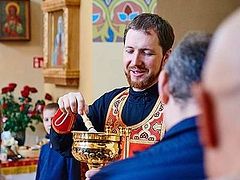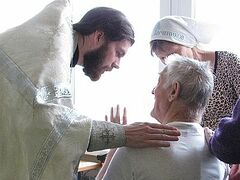This article was written as a response to the statement by the renowned Greek preacher and spiritual author, former Archimandrite Andreas (Konanos), that he has decided to quit the priesthood.
Any loss causes grief. The abandonment of a wife by her husband, of children by their father, of friends by their friend—not to mention the abandonment of the ministry by a pastor—above all causes pain and sorrow. You can’t be happy when a tragedy occurs. Likewise, the fact that the preacher of “joyful Christianity”, who taught us how to get over various crises and overcome conflicts, has given up his pastoral ministry so easily shouldn’t be a cause for happiness.
Everyone was shocked by the suddenness and unexpectedness of his statement. Neither his social media pages with his radiant smiles, optimistic phrases and mood, nor his positive publications and sermons showed the slightest hint of his action to the public at large. Could even the social media presence, the smiles and the seemingly sincere reflections serve as no more than a mask behind which a man’s unseen, innermost essence is hidden? Could there be something greatly differing from what is outwardly demonstrated? Therefore, can doubts, inner struggle, disappointment with one’s chosen path and, ultimately, despair be concealed from a preacher’s admirers?
Some hurried to praise Andreas (Konanos) for the “honesty and courage of his step”, taken “sincerely and according to his conscience”. Others are quick to condemn him for his “betrayal”, saying that they knew that “this liberal in a cassock would go.” Neither position is good for us. In fact, a profound personal tragedy has happened before our very eyes, and its consequences are still unclear. It is impossible to commend him, yet there is no sense in denouncing him. We can only feel sorry for Andreas Konanos—while we should pray hard for him, we can hardly approve of his move. Throughout our history there has not been a single priest who quit his priesthood or a single monk who renounced his vows who was happy afterwards. Once a cleric of the Church has gotten carried away by the world, all traces of his talents, gifts and good undertakings are destroyed. We hope to see exceptions, but all the cases we know of present a sorrowful picture.
Is there any reasonable explanation for his decision? The answer is yes.
It may turn out to be very simple: Andreas Konanos is a human being, like any of us. And all people yield to temptations. You can’t live in the world without being tempted by it. That is the law of our sinful world, and its variations are innumerable. The devil has a unique individual temptation to offer to every child of God.
For example, if a monk lives outside the monastery, appears daily in the media, on TV and the radio, is invited to public lectures, talks and meetings and meets with his friends at the café in the evening, he will inevitably deal with the spirit of this world, see individuals of the opposite sex, associate with them and succumb to temptation. If all he sees is the world with its rules of life instead of the monastery, there is a great risk that he will change his manner of living, and his consciousness, heart and inner world will gradually be reshaped. How long will his spiritual reserves last if instead of praying he spends most of his time on social media, answering text messages and writing comments? With fatigue and worldly cares, he has no time for prayer at all. Having lost prayer, he loses the most important thing: communion with God. Loss of prayer destroys everything; and it is followed by something that can’t be explained by logic.
There is only one reason underlying the abandonment of the priesthood. A priest quits his priesthood when he finds it burdensome. A person suddenly feels that his ministry has become something alien, exterior and foreign to him. Having absorbed a different spirit and a different worldview, he feels that now he himself is alien to the priesthood. Like the character from Michael Lermontov’s epic poem “Mtsyri”, he longs to run out to the open, “from stuffy cells and prayers to that wonderful world of anxieties and battles.” At first the world indeed seems wonderful—but only until a certain point in the future. However, according to the spiritual laws, it is prayer (that wonderful meeting with God) that brings our souls real freedom.
The abandonment of the priesthood is the result of previous temptations, and abandonment itself brings about catastrophic changes in the soul. Compare Andreas (Konanos)’s Instagram photo before his resignation, when he (though with a short beard) still wore a cassock, with a photo after his resignation, where he wears a short-sleeved shirt (though smiling the same smile). You’ll see a different face with different eyes, which are now vacuous, lacking the former depth and filled with something else. Unfortunately, we see a different person who we didn’t know before.
What staggers us the most is the contrast between our distress and the elevated mood of Andreas Konanos. If you read his statement, you’ll see that it contains absolutely no hint of his inner pain or anguish. On the contrary, it is we—readers of his books and listeners to his sermons—who feel this pain. Meanwhile, he still smiles. Has his preaching of “joyful Christianity” and the elimination of the sense of guilt resulted in him abandoning the priesthood so easily without a trace of grief or regret? What if the passion for modern psychology has destroyed the sense of the sacred in the pastor’s soul?
His attitude towards the priesthood he declares in his statement is strange too. This is what Andreas (Konanos) writes about his priestly vestments: “I kiss them and thank them for helping me for two decades feel that the whole globe is my motherland, to live amazing theanthropic moments and meet beautiful people in all parts of the world.” Of these three theses regarding the priesthood only one is correct: the one about God’s presence in our lives—although this must be an attribute of the lives of all Christians, both clergy and laity. The other two theses sound strange. Are we ordained as priests only to travel all over the world and meet nice people? For any Christian (no matter whether he was ordained or not) every fellow human being is the image of God and every place on the earth is that of the work of Divine Providence. But the essence of the priestly ministry is not in this. A priest is someone who serves God and witnesses to higher things in our physical world. He witnesses to the Cross and the Resurrection of Christ; through his ministry human souls die for sin and are resurrected for eternal life. This gift isn’t a personal achievement; it is given by the Holy Spirit in the sacrament of Ordination through the succession of Christ’s disciples. But the Apostles didn’t preach the Gospel everywhere to feel that “the whole globe is their motherland” and “meet beautiful people in all parts of the world.”
Andreas Konanos writes: “I will continue to serve and love all I meet… I will continue to write, speak and help with my poor strength whoever I can.” But how will you teach others not to divorce if you have just ‘divorced’ your priesthood? How can you call for faithfulness to the sacraments of Baptism, Confession, Communion and Matrimony if you have so easily renounced your own Ordination? It is hard to overcome this contradiction. But by all appearances the creative work of Andreas (Konanos) will no longer be about this. It will deal with purely secular psychology, relieving emotional stress and coping with internal contradictions, returning a positive mood to pessimists and cultivating positive emotions as the main purpose of human life. All that remains in him is the desire to communicate and to teach. What has disappeared is the participation in the sacred, in which the human co-dissolves with the Divine, wherein our “omniscient” ego often becomes silent, making room for the grace of the Holy Spirit. Actually, that’s the essence of being a priest.
Many have noticed that the creative work of Andreas (Konanos) has been largely influenced by psychology. We have given him the benefit of the doubt in this respect, reading and listening to his talks with joy. We believed it to be a successful symbiosis between the experience of life in the Church, knowledge of the Patristic tradition and the experience of secular psychology. Now it is clear that we were mistaken. The secular environment has taken from us a man who once left the world to devote himself to God. Exercising its rights as an aggressor, this environment takes the best from us, seeking out our weak points.
There were times when people sacrificed their lives to retain their priesthood. They faced the firing squad, were executed by the order of the NKVD troika and accepted martyrdom. Their faithfulness to the priesthood was to the point of total self-abandonment and denial of bodily and mental comfort. And the lead that cut the air and mercilessly went into their flesh couldn’t kill their boundless fortitude. Their faithfulness to the Church brought them to the scaffold, but they didn’t quit the priesthood.
Persecuted, tortured, starved, intimidated, exhausted, emaciated and deprived of their churches and monasteries, they remained faithful to the sacrament of the priesthood, celebrating the Liturgy even in prisons and labor camps, hearing confessions and giving Communion in places nobody could imagine. And they died for that. Martyrdom was their preaching—through their lives rather than in word. Their preaching is a mute reproach to all of us, who are used to talking about Christianity easily and joyfully. Faithfulness is a forgotten, “downtrodden” and ridiculed word. Soon it will be awkward to talk about faithfulness to the sacrament of Matrimony. Secular psychologists will remove this contradiction too, saying: “Accept what you have, just live and enjoy your life—everything is fine with you. Daily smiles in your social media pages are the most important thing.”
The action of Andreas Konanos is a huge lesson for us. This chiefly concerns us—priests who preach publicly, speak in the media, run our blogs and other social platforms carefully and competently, especially those who are engrossed in secular psychology, putting aside the experience of the Church and the Holy Fathers. We run the risk of falling away like Andreas Konanos. Since he has fallen away, we may follow him. We must keep in mind that we were ordained to serve the Lord and not for blogs, likes and psycho-training sessions.
If you, priest, see the number of your subscribers increasing, all your posts and photos accompanied by thousands of likes, and you begin to have a sweet feeling, know that you’re in a state of delusion. Your self-confidence will have the same result as we have just seen with Andreas Konanos. If your personality is surrounded by admiration and praise and all doors are open before you, beware—a temptation is near. If in the evening after finishing your fussing in front of your laptop you fall into bed, having no strength and no desire to pray, grace will leave you soon. If you have forgotten your spiritual father and sincere confession but have mastered psychological tricks, thinking you’ll change someone else’s life in a tick, a fall awaits you.
The devil is in no joking mood. His task is to undermine our faithfulness: to family, the Church and our own vows. Neither spectacular abilities, nor stunning success, nor perfect knowledge of psychology will deliver us from temptations. The devil’s temptation boils down to the following: “Descend from the cross!”
As for laypeople, they should understand that anyone can fall. Even the most revered pastor can slide down the abyss of temptation. The pastor guides you to Christ by his service and sermons—so walk towards Christ while praying for your spiritual father so that he can remain with Christ to the end.
We recently discussed at length the place of secular psychology and PR-technologies in theological seminaries on Pravoslavie.ru.[1] It appears we failed to understand the seriousness of the temptation and how it can all end. If we train future priests who will gain public infatuation with their psychology and soon kiss their vestments reverently and lay them aside forever, we are not worth a brass button. But if we want our seminarians to grow into pastors who bear at least some resemblance to Archimandrite John (Krestiankin) and Archimandrite Kirill (Pavlov), we need something other than public image, glamour and cheerful witticisms.
I will repeat myself: every time, the abandonment of the priesthood is an enormous loss both for the Church and for those who saw a pastor and a spiritual father in the preacher. This loss gives rise to pain and chagrin, all the more so because he has done this so easily. In this particular instance the tragedy resembles Adam’s loss of his place in Paradise.
From that time many of His disciples went back, and walked no more with Him. Then said Jesus unto the twelve, Will ye also go away? Then Simon Peter answered Him, Lord, to whom shall we go? Thou hast the words of eternal life. And we believe and are sure that Thou art that Christ, the Son of the living God (Jn. 6:66-69).
The words of the apostle are so relevant:
Be sober, be vigilant; because your adversary the devil, as a roaring lion, walketh about, seeking whom he may devour: Whom resist stedfast in the faith (1 Pet. 5:8-9).
May God give us living faith. And living faith means faithfulness to the living God.
* * *
Of course, we do not know all of the reasons for Andreas Konanos's abandonment of the priesthood. Since this article was first posted in Russian, Andreas Konanos has responded to people's reactions (from the Union of Orthodox Journalists):
“I did not divorce Christ. I did not divorce God. I divorced a particular organization,” Konanos said in a video on his Youtube channel, which he called “A New Beginning”. "You shouldn't judge so hasty about my "new" life on its first day until I said anything about myself, until I said anything about the details, causes, reasons, motives until I started talking at all."
Konanos did not name the reasons for leaving the GOC but urged not to make hasty conclusions and respect his choice.
'"They write to me: “You betrayed your vows!' What vows? I am not tonsured, said the theologian. “The most difficult thing, of course, is the question of my priesthood. But this does not mean that I disown Christ, that I do not love Christ. Trust me, these days I feel the presence of Christ very well. I feel that He loves me, that He understands me. And believe me, I also understand Him very well. I understand how He felt at a time when no one understood Him, except for a few people" (






